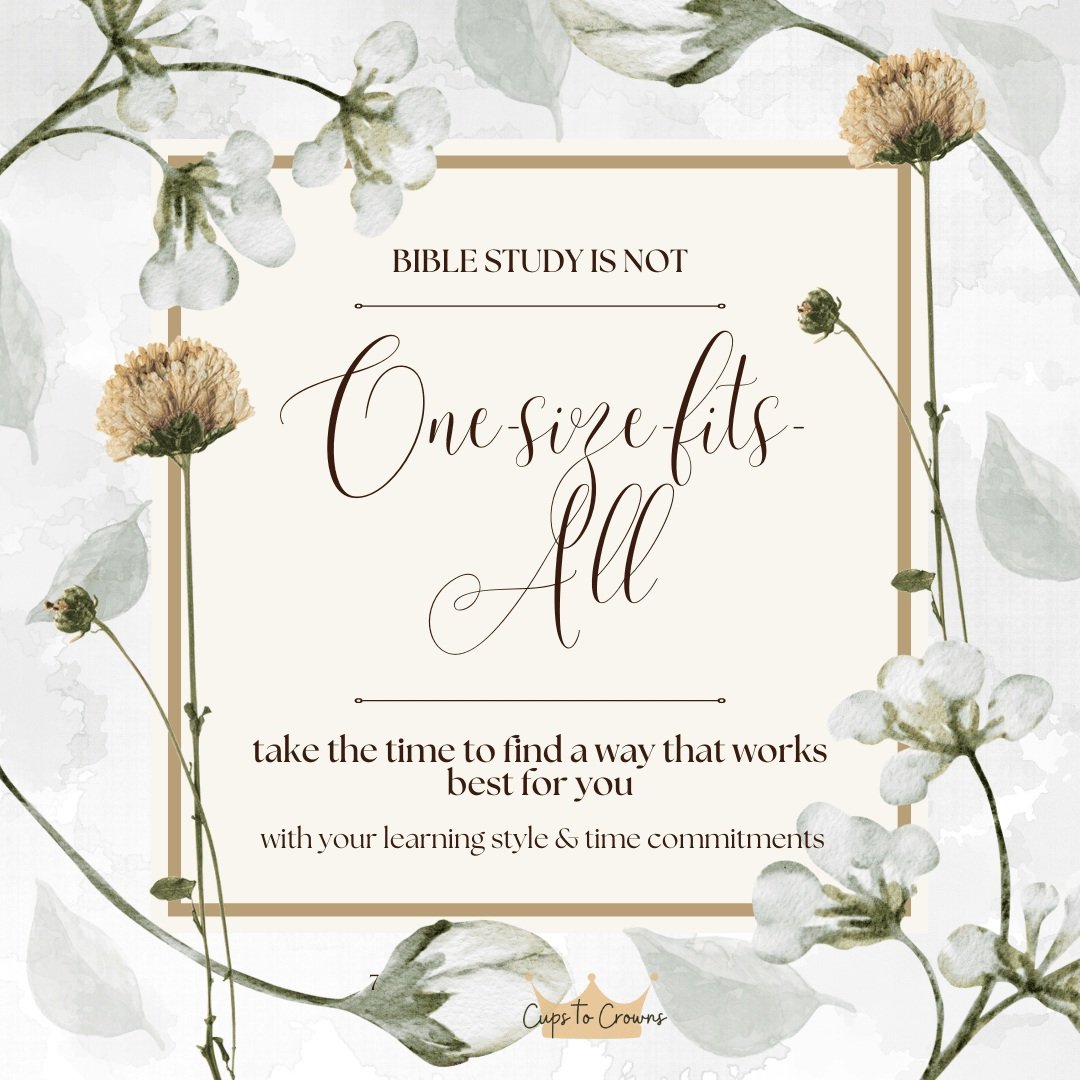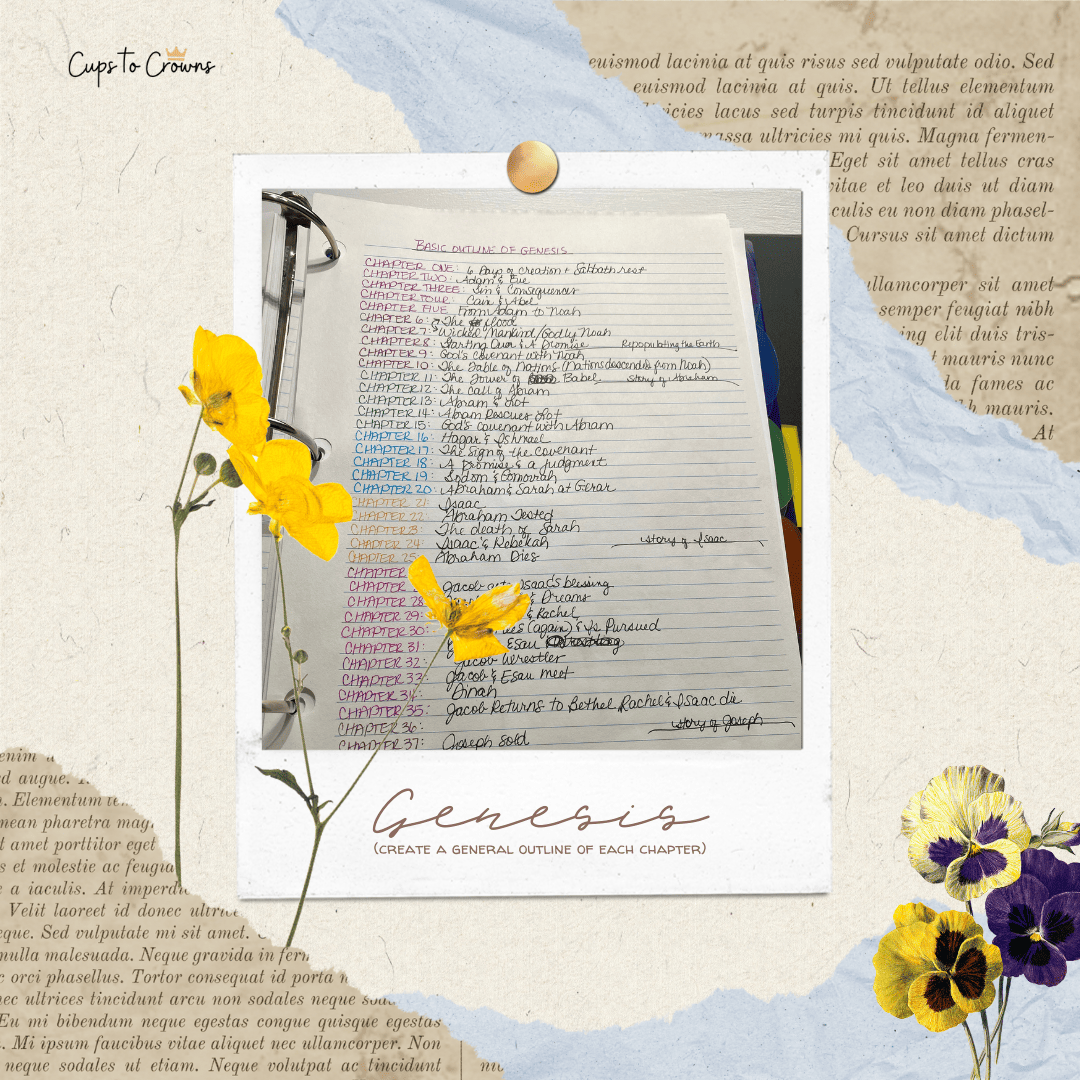My In-Depth Chronological Bible Study Method
If you have decided to join me in studying the Bible chronologically, I thought it would be helpful for you to see my in-depth approach. For this study guide, I will assume you have chosen to follow along using our free Chronological Bible Reading & Study Plan found in our FREE RESOURCES tab at the top of the blog.
In the past, I have used many different study methods. What my brain seems to have settled on is a hybrid of inductive Bible study, verse mapping, and notebook bible journaling of what I have learned.
*Just as an FYI, notebook bible journaling is writing out in a notebook the revelations I have received as I study. It is not using washi tape, shape foldouts of information, images I draw, or Scripture I write out in the margins of my Bible. There is nothing wrong with any of that type of creativity, it is just now how I have chosen to do this particular venture.
Advice Before Getting Started
Some of us learn best by observing how others do what we are unsure about. Because of that, I am giving you the exact method I am using to study. However, I want to encourage you to use it as a jumping-off point.
Please don’t feel you need to follow my method exactly or you are “doing it wrong”. If you don’t know what works best for you, give yourself time to try different methods to see which you like best. However, don’t stop your study and start over if you feel a particular study method isn't working. That can become a vicious cycle. Keep moving ahead trusting the Holy Spirit to help you.
Don't underestimate the value of reading the text over and over and over. It is not a waste of your time. It helps cement it in your mind and the Holy Spirit will reveal things to you all along the way.
Don’t let the number of steps here intimidate you. Take them one at a time. If you don’t have an answer for something right away, come back to it when you do. It won’t take long before you are flowing through the steps as your brain automatically looks for the answers to some of the questions listed below. It’s like muscle memory. For ease of reference, consider highlighting with one particular color any blanks or questions you have.
No matter what verse or principle you are studying in Scripture there will be a controversy about it. Don't worry about it. Do your study to the best of your ability at this point in your walk with Christ. When you are ready, the Holy Spirit will teach you more. Until then, don't worry about what might be to the right or to the left. Keep your focus on what is right in front of you (Scripture!).
Be prepared for blessings but know that it takes consistent work on your part, just like Adam having to cultivate the ground to produce food. It is intense, hard work, and there will be times you would rather be doing anything other than reading and studying. This study shouldn’t feel like a chore you are forced to do. You should look forward to the blessing of your discoveries; consider it your daily manna. But the enemy will fight you as you strive to taste of the Lord and see that He is good.
Whether 5 minutes or 50, do as much of your study as you have time for each day. Just pick back up where you left off and keep going.
A Walk-Through Of My Detailed Bible Study Method
Get Prepared By Creating The Framework
Even before beginning the actual study, I suggest you get a notebook or binder and set up a place to house your study material - because you will have a lot of material! Of course, this can all be done electronically but I personally prefer paper and pen so that is what I will be sharing. For simplicity's sake, I will be using Genesis as my example.
Pray. Because you are allowing the Holy Spirit to guide and direct your study of His Word, you need to pray before doing anything else. He is the only perfect teacher.
Grab your study materials: favorite Bible(s), notebook or binder, pens, and either paper or electronic research material.
Set up your notebook:
Page one: Background of Genesis
Page two: Basic outline of Genesis
Create 50 pages, one page per chapter for an overview
A folder to house supplemental material such as maps.
Step One, Page One. The Background of Genesis
Using your Bible, read the introduction of your chosen book and record the information below. You won’t always know the answers to some of these until you finish Genesis.
Author:
Whom the book was written to: (could be believers or non-believers/Jew or Gentile)
When the book was written:
The overall theme of the book:
Any notes or interesting tidbits you learn along your research trail (this can be a seperate page)
Step Two, Page Two. A Basic Outline of Genesis
Our goal here is to gain the overall flow of the story of Genesis as a whole. We aren’t looking for details yet. Some Bibles have chapter headings that reveal their themes.
Step Three. Overview of Each Chapter
This next step involves a lot of moving parts. Don’t freak out. Continue to take it one step at a time.
_____In your notebook take 50 pages (because there are 50 chapters in Genesis) and at the top of each page, write the theme of the chapter (found on the outline we did in the step above).
_____Following the Chronological Reading Plan, read chapters 1-5 in Genesis to get an overview of the flow of the events in each chapter.
_____Go back again to the first chapter in Genesis. Working on one chapter at a time, do the following:
Highlight anything that stands out to you. It could be a word, a phrase, a name, or something you want to look into deeper.
Beneath the theme title, create a chapter breakdown (outline or a simple list) with key points you noticed. Be brief. We aren’t looking for details yet.
Keep a running list of any questions or insight that pops into your mind as you are doing your overview reading. I highlight these in orange so they don’t get lost.
Step Four. Verse-by-Verse Cultivation of The Text
This is where we get into the nitty-gritty of our study. At this point, we are no longer reading to get an overview of the context but reading it critically. Remember, take it one chapter, one step at a time.
_____Starting with Genesis 1, read it again. This refreshes your mind and keeps it in context.
_____Look at your chapter and look for answers to the 5 Ws and the H (who, what, where, when, why, and how). If you are having trouble with this, train yourself to ask, “so what.” (Jesus said such and such…so what? Who did He say it to? Why did He say it? What happened when He said it?")
_____Record your answers to these questions in your notebook's chapter 1 page. Try to get your answers directly from Scripture. Do not assume anything. Sometimes, as you read chronologically, you will come across answers to your questions in one of the other 65 books so don’t fret if you can't fill in everything right away. Your questions will be your own based on each chapter and verse but this list will help:
Who is the main person the chapter is about?
Who do they interact with?
What is happening in the chapter?
What issue is this person dealing with? Briefly summarize it in your own words.
What are the instructions given? Are consequences given? Make note of them.
Who do the instructions/promises/consequences apply to, certain people or everyone?
Where did the events of this chapter take place?
What about the location? Does the chapter reveal anything or do you need an additional study?
Were the people in this location known for certain beliefs and lifestyles? (think Sodom and Gomorra or the church at Corinth)
When will the events (or promises or corrections) take place?
What are the conditions of the promise or correction?
Who was (is) the promise or correction for?
Why did the events from this chapter happen? Scripture won’t always tell us.
What does this chapter tell you about God? Make note of anything you learn about God & His character.
_____Look at the chapter as a whole again. What words or phrases stand out to you? Make note of repeated words (they often reveal the theme of the chapter).
_____At this point, I either do a word study or verse map. I don’t map the entire chapter, just verses that stand out to me for whatever reason.
_____If you choose not to do a verse map, look up cross-reference verses of whatever stood out to you.
_____Do additional research as desired. You can take this as deep as you like or skip this part. It’s your study. Some examples of possible research:
A location: what were the people from this location known for? How did they live (in tents, in homes, with many relatives, all alone)? Why was this location named such and such?
A character study.
A topical study (such as the early church, various Jewish festivals)
A hand-drawn map of the locations talked about or simply copy a map for your files.
Check Commentaries or YouTube teachings
_____What is the key biblical principle or revelation you have learned from this chapter? Write it down.
_____As you finish each chapter, ask yourself questions. Your questions will be specific to where the Holy Spirit is directing your attention. For example:
Are there errors in your beliefs that this chapter has exposed?
How does God want you to apply this “new” truth to your life?
What is one thing you can do today to adjust your attitude and actions?
That’s it! You are now ready to begin chapter 2 of Genesis!
Closing Thoughts
Friend, there are so many ways we can study the Bible. If my study method doesn’t appeal to you, consider doing what I did and mash it up to make your own. Bible study isn’t a one-size-fits-all process. What makes sense to your brain may not compute with mine. God has created each of us with our own learning styles and life situations that demand our time.
I know how easy it is to get overwhelmed. In whatever way you decide to study Scripture, remember to take it one day at a time, one book at a time, one chapter at a time, one verse at a time. Commit to your study time, put in the work, and God will reward your efforts! He promises that those who diligently seek Him will find Him.
**For some of you, this post is a repeat as it was previously send out as an email to the Cups to Crowns blog subscribers.
***The Chronological Bible Reading and Study Plan mentioned in this post can be found at the top of the page in the Free Resources tab under reading plans.
















